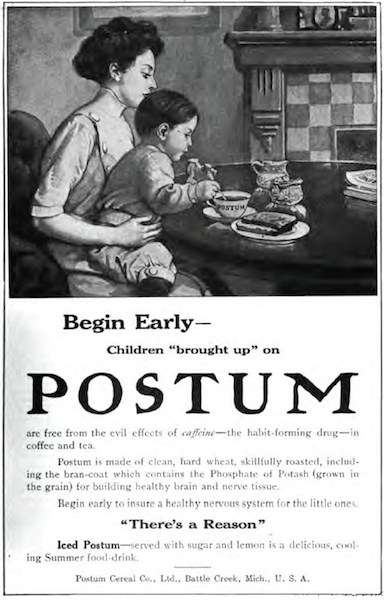People's fear of coffee and caffeine stems from a misunderstanding.

For professional baristas, please follow the coffee workshop (Wechat official account cafe_style)
More and more people like to drink coffee, but the reason why people like coffee is not just because it is free: there is growing evidence that eating the right amount of coffee is good for your health.
TIME reported earlier this year: "so far, the relationship between coffee and health is very obvious." Recent studies have shown that people with coffee drinking habits are less likely to get diabetes, stroke, heart disease and some cancers. " The news comes as a shock to even the most professional coffee connoisseurs-coffee has always been notorious among health-oriented American consumers. But if coffee is so good for your health, where does its negative reputation come from?
The beginning of the 20th century was the exact time of the event, when the health reform movement was in full swing. As an entrepreneur and agricultural salesman, Charles William "C.W." Post) had a nervous breakdown in 1885 (today one might say he was "exhausted"). He went to a rehabilitation center for help and was told that if he wanted to recover, he had to give up the use of irritants. Coffee is a major example.
He not only followed this advice himself, but also invented a coffee substitute called "Postum", which was mainly composed of wheat, gluten and molasses, which was put on the market around 1895.
Persia handled most of the company advertisements and visited newspaper advertisers door to door to persuade them to let him advertise the decaffeinated drink. One of the ads reads: "remember, by rejecting coffee and unnutritious foods and buying Postum coffee meals, any common disease can be cured." A newspaper advertisement in 1906 claimed that drinking coffee would lead to blindness.
According to Mark Pendguest's book, left-handed Coffee and right-handed World (Uncommon Grounds: The History of Coffee and How It Transformed Our World), the Great Rapids Evening News (Grand Rapids Evening Press) gave him considerable space to advertise after being persuaded by Persia (Persia persuaded them that coffee would "turn blood red"). Postum is not the only food marketed in Persia. He has declared that grape nuts are "the most scientific food in the world" and "cure appendicitis".
At the same time, the coffee industry fought back with other short stories. For example, Melinda P. Kyle, 114, claims that the secret to her longevity is drinking coffee.
At a turning point in 1905, Collier magazine published an editorial criticizing misleading food advertisements. One reader pointed out that if the magazine published promotional information about the product at the same time, the article would be false. Collier magazine withdrew the Persian ad, and he responded by placing an advertisement in national newspapers, claiming that the editorial author suffered from "gray matter solidification". As a result, Persia was taken to court in 1907, and the court ordered him to pay $50000 in damages because he admitted that he "did not take the time to prove whether the commodity was true or not after giving it a high rating."
Pendguest explained that although the verdict was later overturned, Persia, a millionaire, seemed to be more restrained, and then the ads were more moderate. A few years after the incident, Merck's "Dekafa" decaffeinated coffee will be available in the United States and compete with Postum. Observing the tendency of people in terms of market activities, we can find that the concept that caffeine (especially in coffee) is harmful to the human body is deeply rooted.
German businessman Ludwig Roselius was the first to invent a way to remove caffeine (or at least part of it) from coffee, believing that his father (a coffee taster) died young because he consumed too much caffeine.
In fact, a recent study shows that drinking four cups of coffee a day can reduce the risk of early death.
Source: time Magazine
Important Notice :
前街咖啡 FrontStreet Coffee has moved to new addredd:
FrontStreet Coffee Address: 315,Donghua East Road,GuangZhou
Tel:020 38364473
- Prev

Drinking coffee is a fortune teller? Coffee reveals your potential personality!
Communication of professional baristas Please follow the coffee workshop (official Wechat account cafe_style) before going to work every day, you must make a cup of coffee before you can really wake up! When you get up during the holiday, you need a cup of coffee to feel that the holiday really begins. Many people have the habit of drinking coffee and have the symptoms of coffee addiction. American psychologist du Vasula visited more than 1,000 people.
- Next

Are you sure you know what kind of coffee you're making? Direct trade in raw coffee beans
Professional barista communication Please follow the coffee workshop (official Wechat account cafe_style) went to Taichung a few days ago to visit the seniors of direct trade. Is it direct trade or fair trade? It doesn't matter, what matters is the truth we see and the process of solving the problem. Direct trade means to enter the producing area and build rural areas "directly" with the standard and spirit of fair trade.
Related
- Unexpected! Ruixing Telunsu lattes use a smoothie machine to foam milk?!
- % Arabia's first store in Henan opens into the village?! Netizen: Thought it was P's
- Does an authentic standard mocha coffee recipe use chocolate sauce or powder? Mocha Latte/Dirty Coffee/Salty Mocha Coffee Recipe Share!
- What is the difference between Vietnam egg coffee and Norway egg coffee? Hand-brewed single product coffee filter paper filter cloth filter flat solution!
- What is the difference between sun-cured and honey-treated coffee? What are the differences in the flavor characteristics of sun-honey coffee?
- How to make Italian latte! How much milk does a standard latte use/what should the ratio of coffee to milk be?
- How to make butter American/butter latte/butter Dirty coffee? Is hand-brewed coffee good with butter?
- Is Dirty the cold version of Australian White? What is the difference between dirty coffee/decent coffee and Australian white espresso?
- Relationship between brewing time and coffee extraction parameters How to make the brewing time fall to 2 minutes?
- Got entangled?! Lucky opens a new store, Mixue Ice City, and pursues it as a neighbor!

